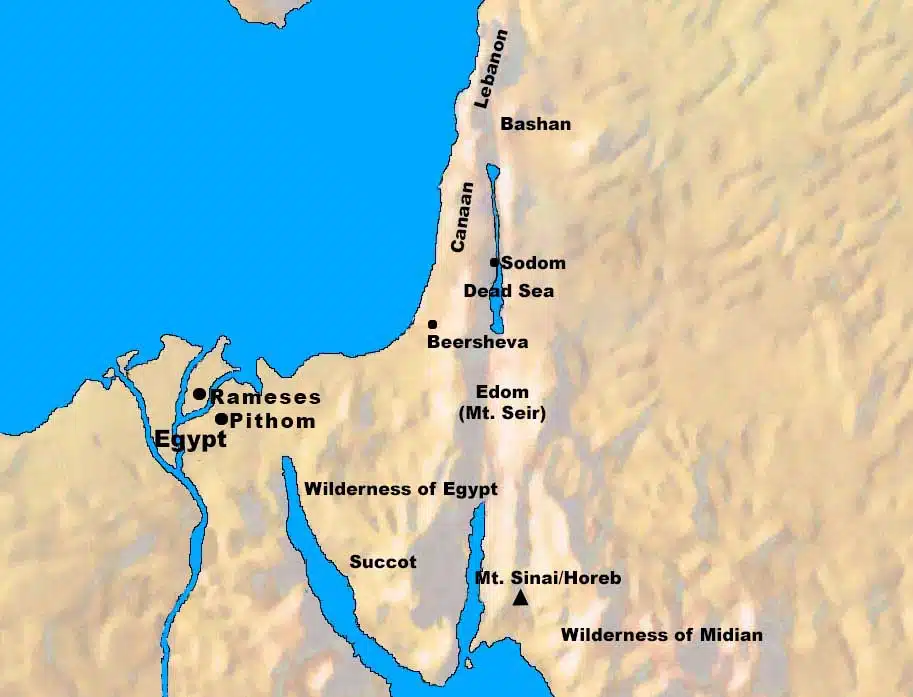These verses not only serve as the introduction to a large section of the book of Exodus that describes the actual deliverance of the Israelites from Egypt (2:23-12:28). This passage (2:23 – 25) also introduces the account of the preparation of Moses. God responds to the cries for help from His covenant people who are in bondage.
Of Moses’ life among the Midianites, little is known. The text of verse 23 simply says that it came about in the course of those many days that the king of Egypt died. It does not say here how long the gap is between verses 22 and 23, but in Acts 7:30 Stephen states that it is 40 years. This would make Moses around 80 years old at this point, around 1486 B.C.
During this period, the sons of Israel sighed (this could also be translated “groaned”) because of the bondage (this could also be translated “labor”), and they cried out. Their cry for help because of their bondage did not go to a pagan god, nor was it simply crying with no idea who to cry to, but their cry rose up to God of their fathers. The word for God is the name for the Creator-God (Elohim, Genesis 1:1). It is not the covenant name for God, which (as we shall see in chapter 3), is Yahweh (or simply YHWH). This name is indicated in the NASB translation as LORD (note the capital letters).
Verses 24 – 25 describe God’s response to the cries of His people. In these two verses, the word God (Elohim) is used four times in describing His response.
God heard their groaning. The word for “groaning” is used only four times in the Old Testament (here, Exodus 6:5, Judges 2:18; Ezekiel 30:24). It seems to signify physical distress, which the hard labor at the hands of the Egyptians would produce.
God remembered His covenant with Abraham, Isaac, and Jacob. This does not mean that God forgot about His covenant. For God to remember is God acting on the promise(s) He has made.
God saw the sons of Israel. Along with hearing and remembering, God “saw” His people. God is not blind or looking another direction. He sees the situation and is fully aware of their sufferings. God took notice of them. The Hebrew is simply “God knew.”
This repetition is designed to emphasize that the God of Abraham, Isaac, and Jacob is not ignorant of the plight of His people nor unwilling to do anything about it. He is a God who sees our sufferings better than we do, and He is going to do something about it.
These actions of God (“hear”, “remember”, “see”, “know”) are indications of His faithfulness to His covenant people. The rest of the book of Exodus is a record of His faithful action on behalf of His people.
Biblical Text
23 Now it came about in the course of those many days that the king of Egypt died. And the sons of Israel sighed because of the bondage, and they cried out; and their cry for help because of their bondage rose up to God. 24 So God heard their groaning; and God remembered His covenant with Abraham, Isaac, and Jacob. 25 God saw the sons of Israel, and God took notice of them.
Check out our other commentaries:
-
Deuteronomy 9:25-29 meaning
As Moses resumed the story of the molten calf, he reminded the Israelites of his intercessory prayer on their behalf so that the LORD might...... -
Numbers 7:30-35 meaning
On the fourth day, the tribe of Reuben brought offerings to the tabernacle. Their offerings were the same as all the other tribes....... -
Luke 16:10-12 meaning
Jesus continues His teaching about money. He tells His disciple the faithfulness principle. He who is faithful in a very little thing will be faithful...... -
Exodus 12:43-51 meaning
Verses 43 – 51 contain more details about how and who could celebrate Passover. It was probably necessary to add these rules because so many...... -
Deuteronomy 5:8-10 meaning
The LORD prohibits the Israelites from worshipping idols.......



